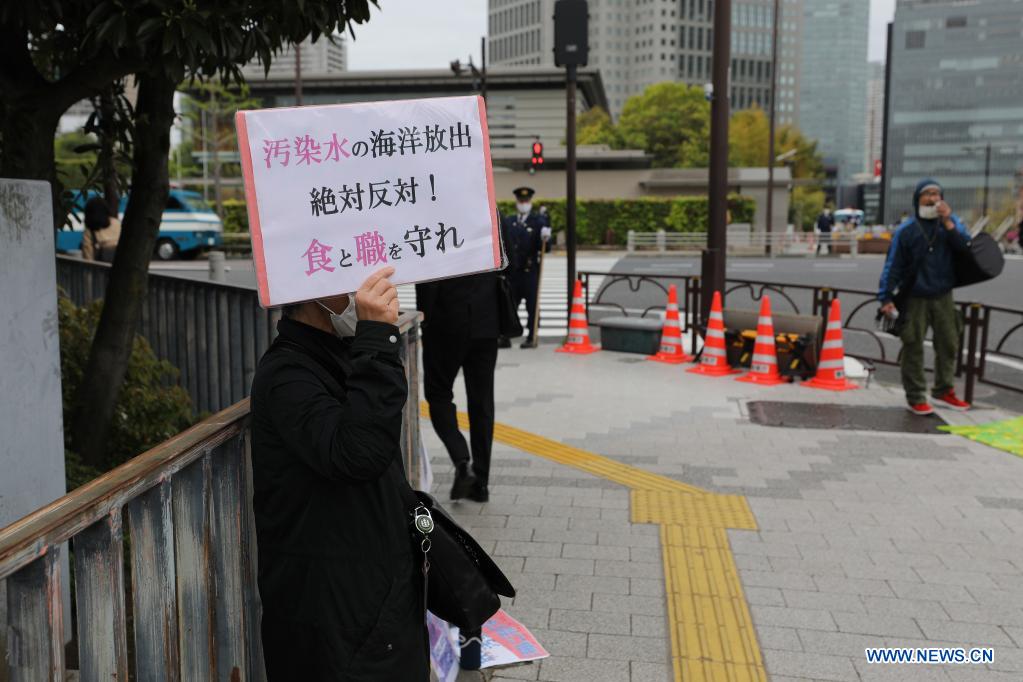Chinese nuclear expert calls on Japan to prudently handle Fukushima radioactive wastewater issue
Wu Yican, an academician at the Chinese Academy of Sciences and the International Nuclear Energy Academy, called on Japan to prudently handle the issue associated with Fukushima’s radioactive wastewater for the sake of its own people, neighboring countries, and the international community as a whole in an exclusive interview with the People’s Daily Online.

A citizen protests against the Japanese government's decision to discharge contaminated radioactive wastewater in Fukushima Prefecture into the sea, in Tokyo, capital of Japan, April 13, 2021. (Xinhua/Du Xiaoyi)
Noting that the oceans are humankind’s shared property and that the disposal of the wastewater from the Fukushima nuclear power plant is not merely a domestic issue for Japan, Wu said the Japanese government should face up to its responsibilities, fulfill its international obligations, and dispose of the radioactive wastewater under the supervision of the international community.
The expert stressed that nuclear waste is generally stored in specific containers or facilities before the best solution for disposal is determined. However, the Japanese government has decided in the end to discharge the tritium-laced water into the sea, the cheapest method among five options examined by Tokyo Electric Power Company Holdings Inc., the plant's operator.
What’s more, although Japan announced its decision to dump about 1.2 million tons of contaminated water into the Pacific Ocean, it chose not to release a detailed discharge plan, including dilution methods, the total amount of radioactive wastewater to be discharged at each interval, as well as the discharge frequency and duration.
Before selecting a finalized approach for the disposal of the radioactive wastewater, Japan should fully consult with the international community, especially its neighboring countries, reaching a consensus with them, while issuing a detailed, open and transparent plan, and accepting third-party supervision throughout the whole process, Wu stressed.
This was also the International Atomic Energy Agency’s advice in its report on the plant released in 2020, he noted, suggesting that Japan should fully disclose its implementation process to the international community upon selecting a final disposal option and be subject to full assessment and monitoring from international third-party experts and stakeholders.
Disposal and discharge of nuclear waste with different levels of radioactivity should be subject to international and industrial regulations, the expert said, explaining that relevant legally binding international conventions have clarified the primary responsibilities associated with nuclear waste disposal.
For example, the Convention on Nuclear Safety, adopted in 1994, and the Joint Convention on the Safety of Spent Fuel Management and on the Safety of Radioactive Waste Management, adopted in 1997, stipulated that the polluter should bear the primary responsibility for the disposal of radioactive contaminants.
Although no standards referring to the total discharge amount of radionuclides were stipulated for as serious a nuclear accident as that which occurred at the Fukushima plant, in terms of current international documents, Japan, as a signatory to the United Nations Convention on the Law of the Sea, must nonetheless fulfill its obligations to protect the marine environment, according to Wu.
Japan’s decision to dump contaminated radioactive wastewater into the sea will impact the fishery and marine ecology, and has sparked strong opposition from the Japanese people and the international community, especially neighboring countries, Wu noted.
Photos
Related Stories
- UN rights experts express "deep regret" over Japan's decision to release Fukushima wastewater
- China urges U.S. to treat Japan's disposal of contaminated Fukushima water according to facts
- Japan’s ‘low credibility’ causes concerns among Asian countries on Fukushima nuclear wastewater release
- Japan's decision to dump Fukushima water into sea sparks domestic, int'l opposition
- Strong opposition, serious concerns raised as Japan decides to dump Fukushima contaminated water into sea
- Key events related to Japan's decision to dump Fukushima contaminated water into sea
- China concerned about Japan's decision to release Fukushima water into sea: FM
- Japan decides to dump Fukushima contaminated water into sea amid domestic, int'l opposition
- Japan's TEPCO to delay removal of Fukushima nuclear debris
- Japan's TEPCO sued by U.S. residents over Fukushima nuclear disaster
Copyright © 2021 People's Daily Online. All Rights Reserved.










